SHAPE WHAT’S NEXT
 2023–2024
COLUMBIA COLLEGE CHICAGO
2023–2024
COLUMBIA COLLEGE CHICAGO

 2023–2024
COLUMBIA COLLEGE CHICAGO
2023–2024
COLUMBIA COLLEGE CHICAGO
In this book, we’ve tried to collect all the information you and your family might need to help you make a decision about whether to apply to Columbia—What you can study; Where you would live; Even how you might pay for it. It’s a lot of information, but it still doesn’t truly capture everything. And that’s okay.
If you’re already familiar with us, you can use this book as a tool to navigate your application process.
If we’re new to you, this book can introduce you to who we are and what we do.
And, if you get stuck, we’re here to help. Anytime you have questions, you can email us at admissions@colum.edu, call us at 312-369-7130, or even connect with your personal admissions representative—you can find them at colum.edu/admissions, or they may even be the person who gave you this book.
So let’s dive in, shall we? See you on the next page.

At Columbia, creativity is both a gift and a skill—it isn’t just something that is “nice to have,” it is essential to the human experience and valued for its own sake. But, Columbia is not meant to be a safe harbor where creativity is sheltered and protected.
We are practical about creativity—it grounds us in the real world.
We understand that for our students to be successful after graduation, they need to not only understand their craft, but also be able to leverage it in the real world. This means being able to take the creative concept and translate it into the time and money required to execute it—to pitch an idea, read and understand a contract, manage a budget, and collaborate with others in ways that balance the idealistic with the practical.
How do we do this? We do it by bringing together a faculty of working professionals who accept students for who they are and challenge them to discover who they can become. We do it by emphasizing the ways in which business and technology intersect with the creative world. We do it by embracing human and disciplinary diversity because we know that encountering new people and perspectives will always strengthen creative work.
If this sounds like something you’re interested in, just keep turning the pages.




Chicago is a world-class city. We like to think of it as an extension of our campus—because it kind of is. As a Columbia student you’ll have theaters, galleries, restaurants, parks, museums, and concert venues to explore whenever you’re not in class—and sometimes when you are. Your time at Columbia will be filled with opportunities to engage with Chicago’s history, culture, and commerce.
And, with the Chicago Transit Authority (CTA) U-Pass, any full-time student can go from our South Loop campus to other Chicago neighborhoods in minutes. Just hop on a bus or the L train.

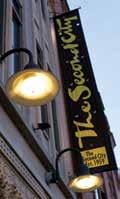
The best way to experience Columbia is to visit our campus. Whether you live in one of the seventy-seven neighborhoods that make up our extraordinary city, or you’re coming from the other side of the world, we think we can show you something new and unexpected.

So, forget about the Chicago you think you know or may have heard about and come spend a day with us. Go to colum.edu/visit to see all of your options. And if you can’t make the trip, colum.edu/ virtual lists some online experiences that will help you get a sense of who we are and what we have to offer.

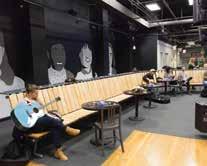
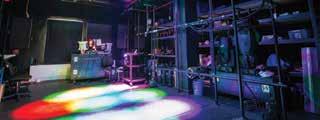
Columbia students enjoy access to industry-standard equipment and spaces where they can practice their craft. Our facilities connect students and faculty in ways that encourage experimentation and growth. And it shows in the finished product.
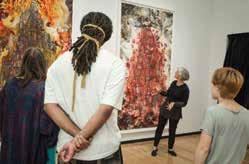
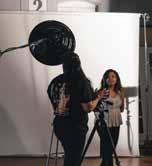


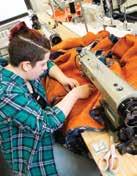
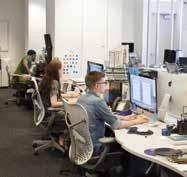

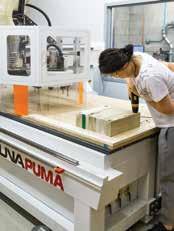
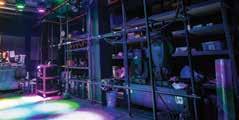
Here are just a few of the places where our students create.
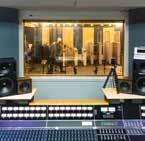
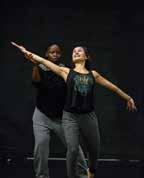

1 STUDENT CENTER
Columbia’s Student Center is the centerpiece of our campus. It’s a hub of activity—a stage, a canvas, a place where creativity blooms.
2 MEDIA PRODUCTION CENTER
The MPC is a 35,500-square-foot, professional-quality media-making facility that includes two film production soundstages, pre- and post-production spaces, and classrooms.
3 GETZ THEATRE CENTER
Our Getz Theatre Center has four performance-ready stages, along with modern spaces for set and prop construction, lighting, costumes, and makeup.
4 FABRICATION FACILITY
Work with state-of-the-art technology in this central making space. With the latest machines, power tools, and equipment, you can create everything from jewelry to 3D models to furniture in a collaborative environment.
5 MUSIC CENTER
From rehearsal spaces, to a full concert hall, to a dedicated Digital Music Lab, Columbia’s Music Center has everything you’ll need to make your music and prepare for your future in professional venues and recording studios.
6 DANCE SPACES
The Dance Center boasts a 268-seat mainstage, as well as eight studio spaces that are available for classes and for students to reserve independently.
7 AUDIO RECORDING AND ENGINEERING SPACES
Fine-tune your skills in our professionallevel audio production facilities. Collaborate with peers, work individually on music, sound art, or sound-for-picture projects.
8 THE COLUMBIA CHRONICLE NEWSROOM
The Columbia Chronicle newsroom is where student editors and reporters produce our award-winning college newspaper. The newsroom houses the most advanced equipment used to gather and report news in print, online, and on social media.
9 FASHION LAB
Take your garments from concept to reality in the Fashion Lab, with all the equipment and software you’ll need to make runwayready garments under one roof.
10 PHOTOGRAPHY FACILITIES
Photography students have access to a state-of-the-art ink jet print lab and lighting studio, as well as darkrooms.
11 GALLERIES
The galleries located across campus provide diverse perspectives on art, design, media, and culture from Chicago and beyond. This network of exhibition spaces serves students, the college community, and local, national and international audiences.
12 HAUS
HAUS is a multi-purpose venue that at times functions as a hangout and study area for students, a nightclub-like music venue, and an event space.

By any definition of diversity, Columbia exceeds most other colleges. But having a diverse community is more than just what is measurable with numbers—we know that creativity only thrives in spaces where people encounter and interact with radical difference. It could be race, heritage, gender identity, sexuality, socioeconomic background, or any number of other identifiers our faculty and students claim. It’s these collisions of difference that can trigger something new and spark the creative process.
We also acknowledge that the structures of social, political, and economic power in the United States were built on systemic racism. This history is part of our legacy as a nation and was built into our institutions—governmental, financial, and educational. And Columbia is not an exception.
That’s why Columbia is engaged in looking both outward and inward to equitably redistribute institutional power, establish accountability, and back up our words with our curricular and financial priorities. We invite those who join our student body to take up this work with us. No matter how much you already know, or if you’ve just begun learning, creative communities like ours (artists, performers, storytellers, communicators) will be at the forefront of translating the conversation into action.
As part of our mission-driven commitment to access and equity, Columbia has never required standardized test scores for admission. They do not play any role in our determination of an applicant’s admissibility to the college, or in awarding merit-based scholarships.
The standardized tests that many colleges have come to rely on have a deep history of bias and were designed to exclude rather than include. Further, we know from years of reviewing applications and getting to know our students that these tests don’t tell us anything important about an applicant’s ability to succeed at Columbia.
colum.edu/testfree
Columbia offers courses like Asian American Literature; Black Artistry and the Archive; Gay, Lesbian, Bisexual and Transgender History in the U.S.; Deaf Representations in the Media; Chicago Latinx Community, Culture and Citizenship; and Transnational and Global Feminisms, along with minors like Black World Studies, Latino and Latin American Studies, and Women’s Gender and Sexuality Studies, which give students new perspectives and deeper understandings of diversity, equity, and inclusion.
Columbia has increased scholarship awards for high-achieving/high-need students, because we know that making college more affordable also makes it more accessible. These awards include merit-based awards specifically for Chicago Public School graduates. When combined with Federal and State grants, these scholarships enable many students to complete a four-year Columbia education debt-free.
colum.edu/cps-scholarships
The Scholars Project is a holistic academic support program that was created as part of Columbia’s Social Justice Initiative to support first-generation students who identify as BIPOC (Black, Indigenous, people of color).
colum.edu/scholarsproject
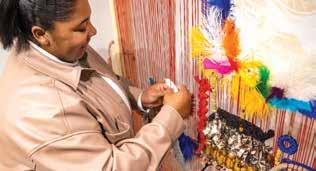
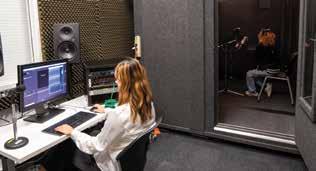

So… let’s fast forward to graduation. Many Columbia alums have achieved success in their fields through traditional routes, while others have translated the skills they learned at Columbia into fields that you wouldn’t necessarily expect. Some have gone into film and television, some are working in galleries and museums, while others have found a home in journalism or politics, and some have leveraged their skills for entrepreneurial endeavors. A Columbia education prepares you to own your life and chart your own success with the confidence that you have the skills to adapt to a changing world.
That’s where our Career Center comes in. Your career advisor is part of a community of advocates who support you in navigating your path from college to career. They sponsor job fairs and host events to help students find employment and learn how to market themselves independently. We encourage all Columbia students to connect with the Career Center as early as possible to start preparing for what comes next.
Here are just a few of the places where Columbia students and alumni are making their creative careers:

• HBO
• Chicago Humanities Festival
• FCB Chicago
• Gensler
• Lands’ End
• CBS
• Leo Burnett
• Lyric Opera
• Ravinia Festival
• Steppenwolf Theatre
• Anthropologie
• NBC Universal
• NASA
• Chicago Sun-Times
• Inside Amy Schumer
• Warner Brothers
• I Think You Should Leave
• Los Angeles Dodgers
• Sierra Club
• Saint Laurent
• RuPaul’s Drag Race
• Interscope Records
• American Horror Story
• Apple TV+
• Riverdale
• Disney/Pixar
• Museum of Contemporary Art Chicago
• BET Networks
• Project Runway
• Last Week Tonight with John Oliver
• Nickelodeon Animation

Columbia students can choose from more than 75 recognized student clubs and athletic teams. No matter your niche, we’ve probably got a club that’ll pique your interest: Cult Cinema Club, Illustration Student Group, Aikido Club, Columbia Renegades Soccer, Hillel, Coalition of Female Creators, and ASL Club, just to name a few.
At Columbia, you and your academic advisor will be teammates in helping you navigate the curriculum and stay on track. Our advisors create a safe and positive environment to support you in exploring areas of study and creating an educational plan.

The Student Diversity and Inclusion Office (SDI) supports students through programming, educational outreach, and intentional community building. SDI’s events aim to encourage Columbia students in the exploration of their identities as well as understanding the ways in which identity is uniquely actualized, expressed, and lived. SDI provides students with opportunities to take part in dialogue around issues of power, privilege, and oppression. These discussions will ultimately help students develop a greater understanding of themselves, each other, their communities, and the world.

Technology resources for Columbia students include access to cloudbased software licensed by the college for student use. Some of the programs available include Microsoft Word, Excel, and PowerPoint, along with file sharing through OneDrive, and Outlook email; the full Adobe Creative Cloud which includes Photoshop, Premiere, Illustrator, and AfterEffects, plus LinkedIn Learning tutorials to get you up to speed on how to use them.
The Services for Students with Disabilities (SSD) Office coordinates support services for students with temporary or permanent disabilities. Staff members assist in providing equal access to educational experiences at Columbia College Chicago. If you’ve had accommodations at a prior institution (for instance, an IEP or 504) please see colum.edu/ssd for more information.
The Student Health Center is staffed by a physician or nurse practitioner, and is available to provide outpatient clinical evaluation, treatment of minor illnesses, injuries, as well as evaluation and triage/referral for more serious illnesses or injuries. Services are available to all enrolled students as costs are included in your student fees.
Designated specially for firstgeneration students, incomeeligible students, and students with disabilities, TRIO is a federallyfunded program that promotes an atmosphere where students can access the support they need as they focus on their academic, personal, and professional goals. A few of the benefits TRIO offers: holistic advising services; personalized student success plans; financial assistance and planning; computer lab and laptop loan services; career, learning skills, and leadership development; mentorship and coaching; and graduate school application support.
Counseling Services help increase selfawareness and address mental health concerns with the goal of empowering students to manage challenging areas in their lives. Services are available to currently enrolled students, and the cost is covered by student fees. Counseling Services provide brief, short-term therapy and can make off-campus referrals for further mental health services as necessary.
At the undergraduate level, Columbia College Chicago offers four degree types. Which one is right for you? Let’s take a look:
• 90% of Columbia students choose a BA program
• Generally requires fewer credits in the major (but there are some exceptions)
• Provides greater flexibility for a minor and/or electives
• Available to spring or fall semester applicants
• Additional application materials (portfolio/audition) required for scholarship consideration
• Perfect for students with diverse interests
• In-depth, focused course of study with more credits in the major
• Less flexibility for a minor and/or electives
• Earlier application deadlines
• Additional application materials (portfolio/audition) required
• Applications only accepted for fall semester (except the Interior Architecture BFA)
• See colum.edu/bfa for more details
• Heavier on technology-based coursework
• In-depth, focused course of study with more credits in the major
• Less flexibility for a minor and/or electives
• Multiple advanced Mathematics courses required
• Prior Mathematics coursework is beneficial
All of Columbia’s undergraduate degrees consist of three components: The Columbia Core, major requirements, and electives. The precise breakdown of credits in each category can vary based on the degree you’re pursuing, but it’s important to note that BA degrees require 120 total credits across these three categories, while the BFA, BMus, and BS degrees require 128 total credits. You can find complete degree planning tools at catalog.colum.edu, and you (especially if you’re a transfer) should work closely with your Admissions Representative to understand how the credits you’ve already earned will count toward your degree.
BA BFA/BMus/BS
33 credits of electives*
120
TOTAL CREDITS
42 credits Columbia Core
128
TOTAL CREDITS
45 credits in your major
11 credits of electives*
42 credits Columbia Core
75 credits in your major
*Figures for major and elective credits are approximate and can vary based on your specific major.
If you have or expect to earn transfer or dual enrollment credits, or credits through Advanced Placement or International Baccalaureate exams, you may have already completed some of the Columbia Core requirements. Check out the tables at colum.edu/ap or colum.edu/ib to see what credits your exam scores have earned. Or, if you’re a Transfer student, talk to your Columbia Representative about how the credits you’ve already earned might fit into your intended degree plan.
FALL 2022 TOTAL ENROLLMENT:
6,424 undergraduate students + 222 graduate students = 6,646 total students
FALL 2022 NEW STUDENTS:
1,606 freshmen + 491 transfers =
2,097 new students
33%
51% identify as students of color identify as members of the LGBTQIA+ community
55 majors
38 concentrations
66 minors
See the inside back cover for a full list.
Nearly 600,000 alumni working worldwide in the arts, entertainment, media, and communications industries.
identify as students of color
58% identify as members of the LGBTQIA+ community
41%
12:1 student-to-fulltime-equivalent-faculty ratio
18 students is the average class size
READ ON TO SEE WHAT ACADEMIC OPPORTUNITIES COLUMBIA COULD HOLD FOR YOU.

We experience so much of the world through screens and there is a multibillion-dollar global industry devoted to creating what appears on them and shaping how we interact with them.
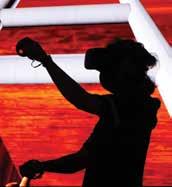
Are you a screenwriter or visual storyteller? A user experience or game designer? Are you interested in post-production editing or visual effects?
Whatever your career path, we’ve got a program that will prepare you to shape the media industries of tomorrow— because technology changes, but the skill to adapt will always be in demand.
#1 Film School in the Midwest for ten consecutive years according to Hollywood Reporter rankings.

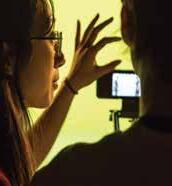
“I tell the truth. As a writer, that’s my job.” At Columbia, Lena studied alongside professors who encouraged her to relocate to Los Angeles. There, her career has taken off with credits like Bones, Dear White People, an Emmy win for her writing on Master of None, and her own Showtime series, The Chi, which was just renewed for its sixth season.

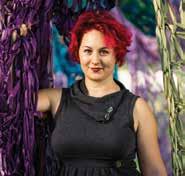
There is power in the ability to create an image or an object. At Columbia, our students learn to harness that power to tell stories, design garments, lay out visual information, and convey meaning. Whether you aspire to have your work on gallery walls, magazine covers, fashion week runways, or at animation festivals worldwide, we’ve got a program that can get you closer to your goals.

And the city of Chicago has tons to offer, with galleries, boutiques, design agencies, and more—places that could provide inspiration for your work as a student and professional opportunities for after you graduate.


Bragging point placeholder
In 2021, Animation Career Review ranked Columbia the #4 program in the U.S.
“At Columbia I was able to collaborate with creators in theater, dance, photography, design, music, and video. This helped lay the groundwork for the interdisciplinary career I have now, which allows me to work with a variety of brilliant people as we all make our art—and make a living.” Rachel’s design work has been featured in venues worldwide from Melbourne to Mexico City to Minneapolis.
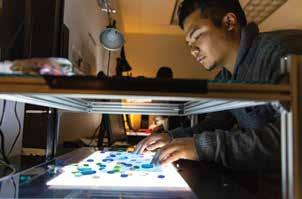

Columbia is situated in a city where the performing arts are celebrated and valued. Artists and audiences alike flock to Chicago for its gritty storefront scene where risk-taking and experimentation are the order of the day. From Second City to Steppenwolf; The Joffrey Ballet to Hubbard Street; our faculty and alumni are sought-after performers who are practicing their craft in a world-class setting unlike any other.
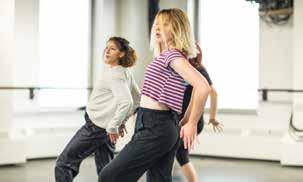
College Magazine named Columbia the #1 college for aspiring comedians—our Comedy Writing and Performance program features a full semester in residence at famed incubator of funny, Second City.
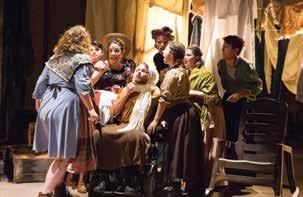
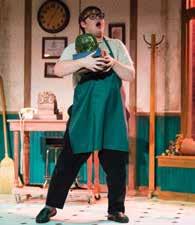
“This is where I cut my teeth. It helped me discover who I was as a performer.” You might know her from the decade she spent on Saturday Night Live, but as a student at Columbia, Aidy spent her days taking theatre courses and her nights performing in Chicago’s famous improv scene. Bryant has collected four Emmy nominations for her work on SNL and her show Shrill.

On stage or in the studio, whether you’re a composer, instrumentalist, vocalist, producer, or live-sound engineer, the world of music and sound offers career paths that align with your passions. Music and sound exist at the intersection of art, science, and technology, and now more than ever, this industry is hungry for professionals who understand the processes behind writing, performing, and recording music.
Columbia’s music and audio programs complement one another, as students collaborate on projects that transcend musical styles and genres. Audio students create, record, and manipulate sound and learn audio theories and practices, while music students focus on theory, composition, improvisation, arranging, technology, history, analysis, and aural skills.
And the results are harmonious.
#2 Music School for Composing for Film and TV according to 2021 Hollywood Reporter rankings.
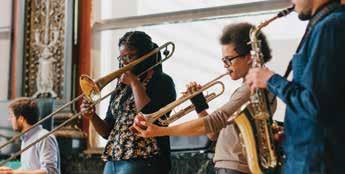
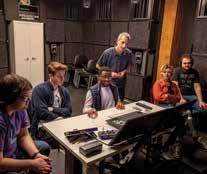
“Columbia has so many great resources. You could edit sound and do voice-overs and use industry-standard software and studios.” With more than 1.5M TikTok followers, Charlie Curtis-Beard’s music is getting attention. Follow him at @charliecurtisb

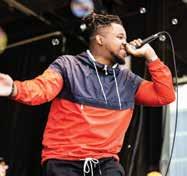
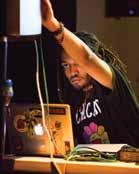
Whether signed, spoken, or written, words are currency. Professionals harness words to inform the public, share information with colleagues, engage audiences with stories, and connect people with each other across divides in language and culture. In a landscape of information overload, it’s never been more important to separate truth from fiction—and communication professionals take on this responsibility in many ways. Journalists treat it as a time-honored, sacred duty. Interpreters bridge gaps to help Deaf persons fully access the world around them. Creative writers distill truths into stories, poetry, and essays that ignite readers’ curiosities.
Whatever your career aspirations, communicating ethically and authentically is a valuable interpersonal and professional skill. And Columbia is ready to help you find your voice.

One of only 13 accredited four-year colleges to offer a degree in ASL-English Interpretation.
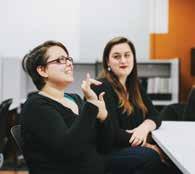
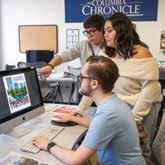
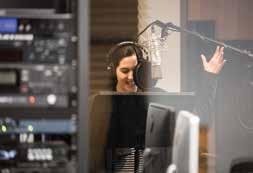

“I chose Columbia because it’s a school that allows me to express myself. It gives a lot of space for students to be creative. The programs are very interesting and allow for easy connections.”

The work of the creative industries doesn’t just happen on stages and screens. Who has the savvy to bring creative works to market? Who gives theaters, concert venues, and galleries the foundational management skills that allow them to find their audience, pursue their missions, and thrive as cultural institutions? Independent artists, musicians, and content creators can also benefit from learning how to self-manage and cultivate a personal brand.
In today’s market, the brands themselves are no longer on the sidelines. Teams of creative professionals are working to advertise, make positive impressions, build communities on social platforms, manage public reputations and relationships, and share core values with customers.

Columbia’s business, management, and public relations programs understand the balance between creativity and commerce. We specialize in helping students hone the skills that make creative work commercially viable. After all, it’s called show business
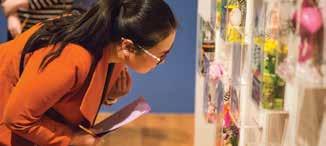 Erica Hubbard ’99 Woodridge, IL
Erica Hubbard ’99 Woodridge, IL

Columbia has been home to the awardwinning, student-run record label, AEMMP Records, for more than 40 years. Each year, AEMMP and other Music Business students travel to the South by Southwest Festival for practical experience in managing and promoting talent.
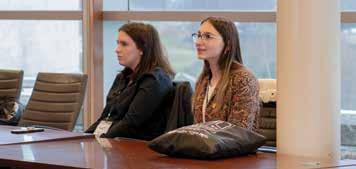
“I value the fact that Columbia has an environment of academic professionals that truly care about the success of their students. The class sizes are great and you can get attention as a student from your instructors which is important.” As an actress, model, and CEO of E. Hubbard Productions, Erica counts Chicago Med, Fall Girls, and The Other Side among her dozens of credits.

Creativity doesn’t happen in a vacuum. Creativity requires context. Creators have to be mindful of the audience receiving their work and the purpose their creation is serving.
That’s why a Columbia education is grounded in the Liberal Arts and Sciences. These courses—in History, Science, Literature, Math, and other core subjects—help artists, performers, and other creative practitioners contextualize their work. And Columbia’s Core includes courses specific to the artistic experience in Chicago—courses that connect you to the city and enhance your understanding of community, business, and technology in the creative industries.
For the student who wants a deeper understanding, Columbia offers majors that take a creative approach to cultural studies and environmental sustainability. Because shaping the future means understanding ourselves and our planet.
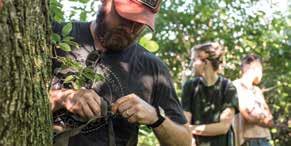
Columbia’s “Big Chicago” courses immerse freshman students in Chicago, and provide them with opportunities to become engaged in discipline-specific explorations of our city.


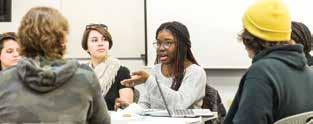
“Having core curriculum classes in my schedule educates me far beyond my major, while also teaching me useful business and industry skills.”
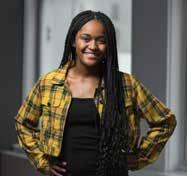
Another awesome part of Columbia: Living on campus! (Did we mention our campus is downtown Chicago?)
Columbia students reside in apartment-style residence centers that are all within walking distance of our academic buildings. You won’t just eat, sleep, and do homework—you’ll also meet new besties and create your Chicago crew.



Start dreaming of spending your days and nights in the center of one of the world’s most exciting cities.
For more information about room types, floor plans, amenities, meal plans, and costs, please visit colum.edu/residencelife.
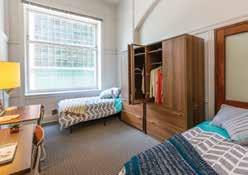 You’ll learn what it’s like to live in the heart of downtown Chicago—all while you’re still in college.
You’ll learn what it’s like to live in the heart of downtown Chicago—all while you’re still in college.


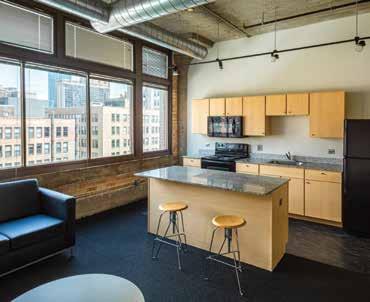
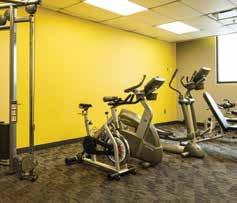
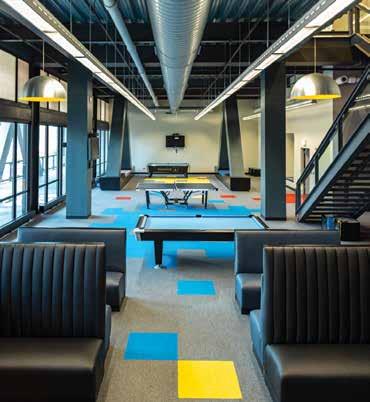

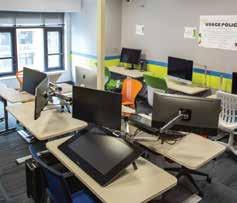 Come home to skyline views in your historic apartment. The Dwight (pictured above) was a paper company’s headquarters in 1911.
Our residence centers are designed with students in mind— music practice spaces, lounges galore, and even a graffiti room.
Come home to skyline views in your historic apartment. The Dwight (pictured above) was a paper company’s headquarters in 1911.
Our residence centers are designed with students in mind— music practice spaces, lounges galore, and even a graffiti room.

Hoping to add a little something extra to your time at Columbia? Maybe you’re looking for some additional challenge in your Core classes? Or an experience abroad might be more your speed. Want to get a head start on your West Coast ambitions? Or, are you already thinking ahead to grad school? If any of these things are in your plans, Columbia’s got something for you.
Columbia’s Honors Program offers an enhanced Core Curriculum experience tailored to our high-achieving undergraduate students who seek a greater academic challenge.
You’ll be in a classroom with other students who, like you, are eager for an intense intellectual experience with deeper levels of inquiry, and you’ll study with faculty who have heightened expectations of student work and engagement. Your Honors participation will also show up on your Columbia transcript, giving you a leg up when you market yourself after graduation.
The Admissions Office reviews every application for Honors consideration. If you meet the criteria, you will receive an invitation to join the Honors Program with your admissions letter.
Work, study, and live in the heart of Hollywood. Columbia College Chicago’s Semester in LA (SiLA) program can provide you with critical experience in the media and entertainment industry to carry into your career after graduation. You’ll explore your career interests through internships and class experiences that are only available in the Los Angeles area.
Our classes are held on a studio lot in Hollywood. While in the program, you’ll learn from industry experts in the classroom (many of them Columbia alumni) and work 15 to 20 hours per week at an LA-based internship. Your internship not only provides an entry into the world of entertainment and media; it quickly demystifies the business of Hollywood. SiLA also provides networking opportunities, exclusive events, tapings, and tours, all of which round out your immersive experience.
Over the 20 years of SiLA’s existence, Columbia has built an industry-wide reputation with an extensive network of entertainment professionals who willingly offer their knowledge and resources to help you get ahead.

Your Columbia experience doesn’t have to be limited to Chicago—We send students all over the world. Our foreign study programs fall into three categories:
• Faculty-led programs (many of them during the summer or our three-week January “J” Session)
• Exchange programs with other universities abroad

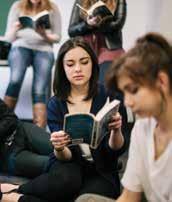
• Connections to independent providers of study abroad experiences

We’ll make sure we find the right one for you! Keep an eye on colum.edu/studyabroad to see info about programs.
Are you thinking ahead about grad school? Well, you’re in luck. Columbia’s combined degree program allows students to earn graduate credits toward one of our Master of Arts programs while still enrolled in an undergraduate major.
After graduating with your bachelor’s degree, you’ll be able to finish the master’s degree in one year. You can indicate your interest in the combined degree program when you fill out your application to the college. Find out more about combined degree requirements at colum.edu/combined.

At Columbia, we’re proud to offer generous aid packages to help make your education more affordable—and we only need three things from you to maximize your aid:
1 For merit-based aid: Submit your Columbia application—Seriously, that’s it, that’s all you have to do.
2 For need-based aid: Complete the Free Application for Federal Student Aid (FAFSA)*. All eligible students who submit a FAFSA are guaranteed at least $1,000 in need-based aid.


3 For talent-based aid: Submit your materials for our talent-based scholarship, the Faculty Recognition Award (FRA). The FRA is only available to fall applicants. Portfolio/audition requirements and submission deadlines can vary based on intended major. See colum.edu/fra and colum.edu/bfa for more.
*Spring 2024 applicants should complete the 2023-2024 FAFSA, which is available now. Fall 2024 applicants should complete the 2024-2025 FAFSA, which is likely to be delayed this year due to changes in Department of Education policies. Keep an eye on fafsa.gov for more details.
Illinois residents who are not eligible to submit a FAFSA can complete the Alternative Application for Illinois Financial Aid. See colum.edu/illaltapp for details.
For students outside of Illinois who cannot complete the FAFSA, talk with your admissions representative about your situation. They’re here to help!

ESTIMATED ANNUAL TUITION AND FEES:
$32,520
For Freshman students, merit-based aid will likely be one of three awards: The Dean’s Scholarship, The Columbia CPS Award, and The Columbia Creatives Award. Most students qualify for the Dean’s Scholarship. The CPS Award is for students graduating from a Chicago Public high school and may carry the name of the specific high school you attended. The Creatives Award is for students graduating from any of the member high schools in the Art Schools Network. All applicants are automatically considered for the scholarship for which they qualify upon admission.
Chicagoland Transfer Award: The Chicagoland Transfer Award was established to recognize transfer students from eligible Chicago area community colleges. One fulltuition award and ten additional awards are available each year. A separate application is required.
Phi Theta Kappa Scholarship: Members of the PTK Honor Society may be eligible for an additional annually renewed scholarship.
Shape What’s Next Scholarship: Students transferring from a four-year college or university may be eligible for an additional annually renewed scholarship.
ESTIMATED ANNUAL ROOM AND BOARD: $22,000
Columbia Excellence Award: All International applicants are considered for this scholarship upon admission.
Columbia Scholar Award: Students who complete the Free Application for Federal Student Aid (FAFSA), using Columbia’s school code (001665), will automatically be considered for need-based aid. A minimum $1,000 annual award is granted to all eligible students who submit a FAFSA.
The Faculty Recognition Award is Columbia’s talent-based scholarship. Portfolio/audition requirements and submission deadlines can vary based on intended major. See colum.edu/fra and colum.edu/bfa for more. Talent-based aid is only available to fall applicants.
To see detailed terms and conditions of all scholarships, go to colum.edu/scholarships. You can get started on your personalized financial plan at colum.edu/netprice.
The Chicagoland Transfer Award, Phi Theta Kappa Award, Shape What’s Next, and Chicago STAR scholarships are NOT included in the figures on the following pages. Each has its own eligibility criteria, and the Chicagoland Transfer Award requires a separate application due by April 1, 2024. See colum.edu/cta, colum.edu/ptk, colum.edu/swn, and colum.edu/star for more information.
If you have completed or expect to complete high school, home school, or a GED and will not earn credit* at a college or university before your first day at Columbia, please apply as a freshman student.
*This excludes the following types of college credit: exam-based credits (AP, IB, CLEP), dual enrollment credits, courses taken as part of a summer program for high school students, and/ or any credits earned during the summer immediately following high school graduation or GED completion.
Columbia welcomed 1,606 freshmen to our campus
They represented 44 U.S. states, Washington, D.C., and 22 foreign countries
were from the Chicago metro area
identified as members of the LGBTQIA+ community
were Chicago Public School graduates
identified as firstgeneration college students
identified as students of color
lived in one of Columbia’s four residence halls
We hope the information on this page gives you a sense of the scope of scholarships and other financial aid available through Columbia, but please know that financial aid packages at any school can depend upon factors that are unique to you and your family. We encourage all students to apply to Columbia, complete the FAFSA, and submit portfolio/audition materials, so that we can prepare the best possible financial aid package for you.
The figures given here are based on freshman students admitted to Columbia for Fall 2023. All scholarship aid is renewed annually provided the student continues to meet the scholarship terms.
96%
of students received a scholarship from at least one of the available categories (merit, need, and talent). Complete scholarship packages ranged from $1,000 to $23,000, and the average scholarship per recipient across all scholarship types was $14,774. All scholarship aid is annually renewed provided a student continues to meet the scholarship terms.
90% of students received a scholarship based on academic merit— typically the “Dean’s Scholarship,” but it will sometimes have a different name. Scholarships ranged from $6,000 to $15,000, and the average scholarship per recipient was $11,434.
66% of admitted students (and 100% of students who submitted a FAFSA) received the “Columbia Scholar Award,” a scholarship based on financial need. Scholarships ranged from $1,000 to $17,000, and the average scholarship per recipient was $5,438.
62% of students who submitted a portfolio or audition received the “Faculty Recognition Award,” a talent-based scholarship. Scholarships ranged from $500 to $5,000, and the average scholarship per recipient was $1,380.
46%
of students who submitted a FAFSA were eligible for a Federal Pell Grant. Grants ranged from $767 to $9,395, and the average grant per recipient was $6,285. Pell Grant amounts are set annually by the Department of Education.
64%
of Illinois-resident students who submitted a FAFSA or alternative application were eligible for the state’s Monetary Award Program (MAP) Grant. The standard MAP Grant is $8,400, but the amount may be adjusted based on the number of credit hours enrolled. MAP Grant amounts are set annually by the State of Illinois.
94%
of students who filled out a FAFSA were eligible to borrow under the Federal Stafford Loan program. Most students were approved to borrow $5,500, but that figure can be adjusted under some circumstances. Stafford Loans can be either subsidized (interest does not accrue while the student is enrolled) or unsubsidized. Loans are always optional and not all students use them.
93%
of parents who filled out a FAFSA were eligible to borrow under the Federal PLUS Loan program. The average approval amount was about $30,000, but it is common for parents to borrow less than the approved amount or to not borrow at all. Loans are always optional.
$22,330 was the average student aid package across all types.
Some students may also be approved for the Federal Work Study program. Wages earned through Work Study are paid directly to the student and can be used at the student’s discretion. Work Study approval is not required to work on campus. Any student can apply for any campus job without regard to Work Study status.




If you have completed high school, home school, or a GED and have earned (or will earn) credit* at a college or university before your first day at Columbia, please apply as a transfer student.
*This excludes the following types of college credit: exam-based credits (AP, IB, CLEP), dual enrollment credits, courses taken as part of a summer program for high school students, and/or any credits earned during the summer immediately following high school graduation or GED completion.
491 students transferred to Columbia
They represented 31 U.S. states, Puerto Rico, and 7 foreign countries
were from the Chicago metro area
transferred from a community college
transferred from another four-year institution
transferred with an earned associate degree
identified as students of color identified as members of the LGBTQIA+ community
identified as firstgeneration college students
lived in one of Columbia’s four residence halls
We hope the information on this page gives you a sense of the scope of scholarships and other financial aid available through Columbia, but please know that financial aid packages at any school can depend upon factors that are unique to you and your family. We encourage all students to apply to Columbia, complete the FAFSA, and submit portfolio/audition materials, so that we can prepare the best possible financial aid package for you.
The figures given here are based on transfer students admitted to Columbia for Fall 2023. All scholarship aid is annually renewed provided the student continues to meet the scholarship terms.
of students received a scholarship from at least one of the available categories (merit, need, and talent). Complete scholarship packages ranged from $1,000 to $22,500, and the average scholarship per recipient across all scholarship types was $13,193.
of students (and 100% of students who submitted a FAFSA) received the “Columbia Scholar Award,” a scholarship based on financial need. Scholarships ranged from $1,000 to $9,500, and the average scholarship per recipient was $4,353
of students received a scholarship based on academic merit— typically the “Dean’s Scholarship,” but it will sometimes have a different name. Scholarships ranged from $4,000 to $13,000, and the average scholarship per recipient was $9,312.
of students who submitted a portfolio or audition received the “Faculty Recognition Award,” a talent-based scholarship. Scholarships ranged from $500 to $5,000, and the average scholarship per recipient was $1,572.
45%
of students who submitted a FAFSA were eligible for a Federal Pell Grant. Grants ranged from $767 to $9,395, and the average grant per recipient was $5,748. Pell Grant amounts are set annually by the Department of Education.
53%
of Illinois-resident students who submitted a FAFSA or alternative application were eligible for the state’s Monetary Award Program (MAP) Grant. The standard MAP Grant is $8,400, but the amount may be adjusted based on the number of credit hours enrolled. MAP Grant amounts are set annually by the State of Illinois.
91%
of students who filled out a FAFSA were eligible to borrow under the Federal Stafford Loan program. Loan approval amounts ranged from $5,500 to $12,500. Stafford Loans can be either subsidized (interest does not accrue while the student is enrolled) or unsubsidized. Loans are always optional.
74%
of parents who filled out a FAFSA were eligible to borrow under the Federal PLUS Loan program. The average approval amount was about $32,000, but it is common for parents to borrow less than the approved amount or to not borrow at all. Loans are always optional.
$22,687 was the average student aid package across all types.
Some students may also be approved for the Federal Work Study program. Wages earned through Work Study are paid directly to the student and can be used at the student’s discretion. Work Study approval is not required to work on campus. Any student can apply for any campus job without regard to Work Study status.




Meet with your current college advisor to discuss degree completion.
Create a free Transferology account and enter your courses at transferology.com.
Get in touch with your Columbia representative! To find out who your rep is, email us at transfer@colum.edu
FEBRUARY
Fall housing applications are available.
JANUARY
Jan. 17: Portfolio Deadline for BFA and talent-based scholarship consideration.
Jan. 22: Spring semester starts.
DECEMBER
Dec. 1: Fall application closes for Acting, BFA; Musical Theatre, BFA; and all BMus programs.
Dec. 15: Transcript deadline for Spring applicants
Spring students: Review your financial aid award letter with
MARCH
Fall students, review your award letter with your Columbia rep.
APRIL
Stay up to date on events and checklist items exclusively for admitted students at colum.edu/connect.
MAY
May 1: Submit your $250 deposit.
Complete the Registration Questionnaire.
Sign up to attend a Transfer Info Session at colum.edu/transfer and learn more about Columbia and the transfer process.
Schedule an appointment with your transfer specialist to discuss your major and degree timeline.
JUNE–AUGUST
Come visit our campus! Schedule your tour at colum.edu/visit.
NOVEMBER
Spring financial aid award letters start going out.
Nov. 11: Open House
Nov. 15: Spring application closes.
OCTOBER
Oct. 1: Spring applicants should complete the 2023-2024 FAFSA. For Fall applicants: the 2024-2025 FAFSA is expected to be delayed until December. Keep an eye on fafsa. gov for the latest information.
SEPTEMBER
Fall and Spring applications open. Apply at colum.edu/apply.
JUNE
Housing contracts go out. Accept your assignment to secure your room.
JULY–AUGUST
Time for Orientation and Convocation!
SEPTEMBER
Housing move-in.
Sept. 3: Fall 2024 semester starts.
Get in touch with your Columbia transfer specialist. To find out the representative assigned to your school or state, go to colum.edu/admissions or email transfer@colum.edu.
Attend a Transfer Info Session! These events are specially designed for transfer students. Learn more about the transfer process, scholarship opportunities, admissions deadlines, and more. Visit colum.edu/transfer to see both virtual and in-person options.
Create a profile at Transferology.com. This free resource allows you to see how your courses will transfer to Columbia. Just enter all of them (including the courses you are planning to take and any AP, IB, and military credits) to see how they will fit into your future Columbia program.
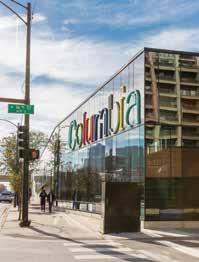
Don’t see your college or courses listed? No worries! Just email transfer@colum.edu.

Meet with your Transfer Specialist! There are one-on-one appointments and virtual Transfer Chats for certain Illinois campuses. Appointments are a great time to talk about your Transferology results, to ask what courses to take next, ask about scholarships and more. Can’t make an appointment? You can also call, text, or email them at any time.
Come to our annual Open House! This event gives students the opportunity to tour academic facilities and residence halls, meet faculty, network with other prospective students, and chat with an admissions counselor. There’s even a Transfer Suite where you can learn more about all things transfer.
The 2023 Open House is scheduled for Saturday, November 11.
Submit your application. Fall and Spring applications open in early September. Admissions decisions can take 4–6 weeks, so the sooner you complete your application and send in your transcripts, the better.
Complete your FAFSA and add Columbia as a recipient (school code 001665). This will allow us to consider you for all grants, scholarships, and loans.
Spring applicants should complete the 2023-2024 FAFSA, which is available now. Fall applicants should complete the 2024-2025 FAFSA, which is expected to be available in December.
If you are not eligible for the FAFSA, Columbia may be able to direct you to an alternative application. Please ask your transfer representative for more information.
Send us your official high school transcript if you:
• were homeschooled, or
• attended a non-US high school, or
• earned fewer than 24 college credits
If you earned your GED, follow the directions at ged.org to send your official transcript.
Submit ALL official college transcripts. For your application to be reviewed, you must have all transcripts from all institutions you have enrolled sent directly to Columbia.
High school and college transcripts can be sent electronically via transcript service or emailed to admissions@colum.edu; or via postal mail to:
600 S. Michigan Ave.; Chicago, IL 60605
Students can typically order transcripts to be electronically transmitted to Columbia through their school’s website. Consult your school’s Registrar/Records Office for assistance.
Submit a portfolio/audition. Fall applicants only. Portfolio/audition is required for BFA and BMus applicants and highly recommended for BA and BS applicants. All submissions are considered for talent-based scholarships. Deadlines vary based on program.
• colum.edu/bfa for BFA and BMus programs
• colum.edu/fra for BA and BS programs
Check out our campus! We have virtual and in-person tours, events, info sessions, and appointments to learn more about our campus, buildings, programs, and services. See colum.edu/visit.
If you do not have U.S. citizenship, you are not a resident/green card holder, and you will require a student visa to study in the United States, please apply as an international student.
Columbia College Chicago enrolls more than 300 international students from more than 60 different countries.

Here are just a few of the countries represented on our campus:
International students will be required to request a new (or transfer an existing) SEVIS I-20 Certificate of Eligibility. You’ll need the I-20 to obtain your F-1 student visa. To issue the SEVIS I-20, Columbia requires:
• A photocopy of your passport showing your full name, date of birth, photo, and passport expiration date
• Proof of sufficient funds to cover the full academic year
• An official bank statement that shows the name of the account holder and the amount of funds available
• A sponsorship verification form (if the funds are not from your personal bank account)
You can learn more about this process at colum.edu/international and colum.edu/sponsorship. Or you can connect with your assigned Columbia Representative—find yours at colum.edu/intlstaff.
We hope the information on this page gives you a sense of the scope of scholarships and other financial aid available through Columbia, but please know that financial aid packages at any school can depend upon factors that are unique to you and your family. We encourage all students to apply to Columbia and submit portfolio/audition materials, so that we can prepare the best possible financial aid package for you.
The figures given here are based on international students admitted to Columbia for Fall 2023. All scholarship aid is annually renewed provided a student continues to meet the scholarship terms.
83% 36%
of students received a scholarship based on academic merit— typically the “Columbia Excellence Award.” Scholarships ranged from $1,000 to $11,000, and the average scholarship per recipient was $7,872 USD.
of students received our talent-based scholarship, the “Faculty Recognition Award,” which requires an audition or portfolio submission. Scholarships range from $500 to $5,000, and the average scholarship per recipient was $3,552 USD.
Acting (BA | BFA)
Advertising (BA)
Animation (BA)
Computer Animation
Traditional Animation
Art History (BA)
Arts Management (BA)
Creative Industries
Film Business
Performing Arts
Visual Arts Management
ASL-English Interpretation (BA)
Audio Arts (BA)
Audio and Sound Design
Audiovisual Systems Integration
General Audio Arts
Live Sound Reinforcement
Music Recording
Combined Degree (BA | MA)*
Comedy Writing and Performance (BA)
Communication (BA)
Computer Animation (BFA)
Contemporary, Jazz, and Popular Music (BMus)
Creative Writing (BA)
Fiction
Nonfiction
Poetry
Cultural Studies (BA)
Dance (BA | BFA)
Design Management (BA)
English (BA)
Environmental and Sustainability Studies (BA)
Fashion Design (BFA)
Fashion Studies (BA)
Merchandising
Product Development
Film and Television (BA | BFA)
Fine Arts (BA | BFA)
Game Art (BA)
Game Design (BA)
Game Development
Game Sound
Graphic Design (BA)
General
Publication Design
Website Design
Graphic Design (BFA)
Illustration (BA | BFA)
Immersive Media (BA)
Interior Architecture (BFA)
Journalism (BA)
Marketing (BA)
Digital Media
Entertainment Industry
Sports Management
Music (BA)
Music Business (BA)
Artist Management
Live and Touring
Recorded Music and Publishing
Music Composition (BMus)
Music Technology (BS)
Interactive Music Design
Sonic Arts
Sound and Music Computing
Musical Theatre (BA)
Musical Theatre Performance (BFA)
Photography (BA)
Commercial Photography
Fashion Photography
Fine Art Photography
Integrated Photography
Photography (BFA)
Photojournalism (BA)
Programming (BA | BS)
Public Relations (BA)
Radio (BA)
Social Media and Digital Strategy (BA)
Sound Design (BA)
Television Writing and Business (BFA)
Theatre (BA)
Directing
Playwriting
Stage Management
Theatre Studies
Theatre Design and Technology (BA)
Traditional Animation (BFA)
User Experience and Interaction Design (BA)
Acting
Advertising
Animation
Art History
Arts in Health
Arts Management
ASL Studies
Biology
Black World Studies
Cinema and Television Studies
Contemporary Music
Craft
Creative Writing
Cultural Studies
Dance
Design Management
Devising Collaborative Performance
Education
Entrepreneurship
Environmental Studies
Fashion Communication
Fashion for Game Art
Fashion Studies
Fashion Styling
Fine Arts
Game Art
Game Design
Graphic Design
Health and Wellness
Hip-Hop Studies
Illustration
Immersive Media
Intellectual Property Management
Interactive Media Development and Entrepreneurship
Journalism
Latino and Latin American Studies
Literature
Marketing
Mathematics
Motion Graphics
Music Business
Nonprofit and Public Affairs Communication
Performing Arts Management
Philosophy and Religion
Photography
Playwriting
Pre-Law Studies
Professional Writing
Programming
Public Relations
Radio
Social Media and Digital Strategy
Sports Communication
Sports Management
Stage Combat
Sustainable Fashion
Talent Management
Theatre Directing
User Experience
Video Production
Visual Arts Management
Vocal Performance
Voiceover
Web Development
Women’s, Gender and Sexuality Studies
Writing for Television
Whether virtual or on campus, our events and tours offer you the opportunity to get to know Columbia.
colum.edu/visit
colum.edu/virtual Scan the code to see what you can expect on your campus tour.

APPLY
Are you ready to apply?
You can get started by reviewing the requirements and deadlines at colum.edu/apply.
We’re always here to help. +1 312-369-7130
admissions@colum.edu
FOLLOW US ON @ColumAdmit
@ColumAdmit
@ColumbiaCollegeChi Search “Columbia College Chicago” on ZeeMee